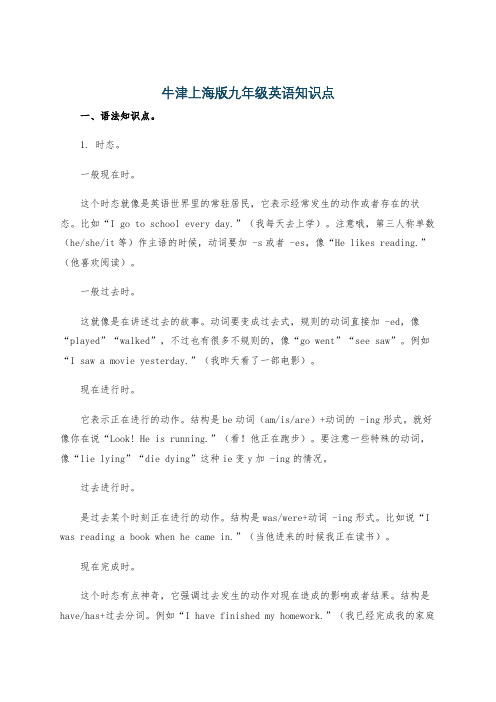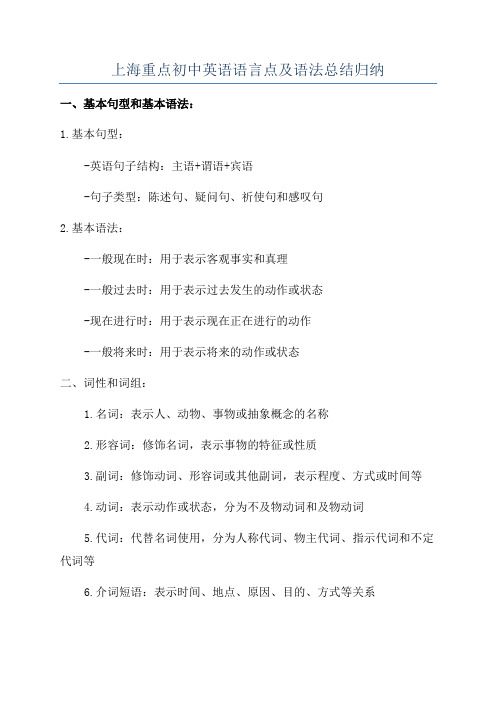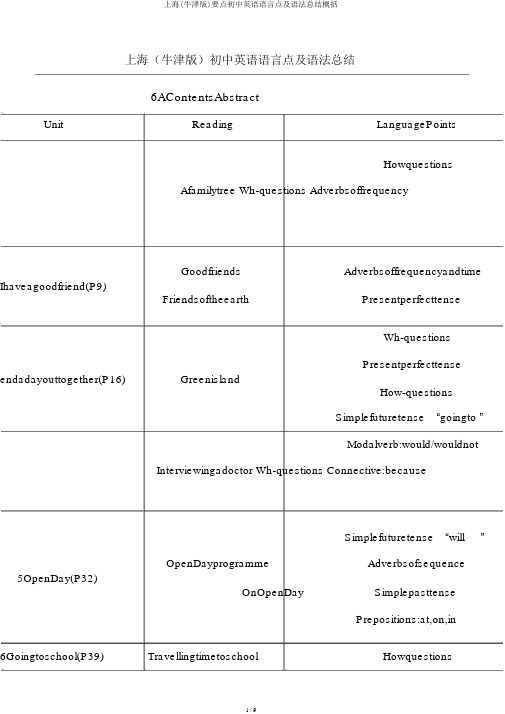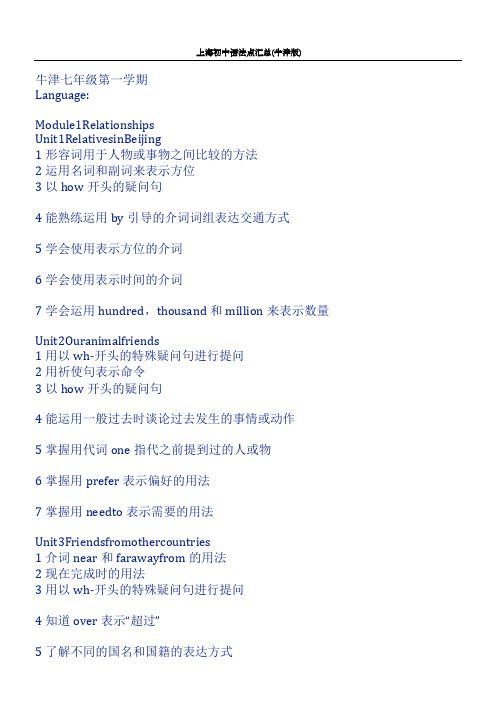上海重点初中语法点汇总(牛津版) (2)
(完整)牛津上海版英语九年级上册全书语法知识汇总,推荐文档

I.现在完成时的概念。
G9 GRAMMAR 现在完成时①表示过去发生的动作对现在造成的影响或结果She has been ill for three days. (她病了三天了。
)②表示从过去某一时间开始一直持续到现在的动作或状态。
We've known each other since we were children. (我们从小就认识。
)I have been a member of the Party for 10 years.II.构成:”助动词have, has + 过去分词”注:规则动词的过去分词的构成与过去是相同,不规则动词的过去分词见附表。
练. 把下面变否定句、一般疑问句并作肯定和否定回答。
1.I have done my homework.否定句:一般疑问句:回答:2.The plane has arrived.否定句:一般疑问句:回答:III.现在完成时用法归纳1.现在完成时表示过去发生的动作现已完成,对现在造成的影响和结果。
(此种用法谓语动词用结束性动词)如:The plane has arrived.常用的时间状语和副词:already (已经) 用于肯定句中,位置比较灵活,但通常放在have/ has 与过去分词之间如:I have already done my homework.yet (还,仍然,已经) 用于否定句和疑问句的句末。
如:Has she finished cooking yet? 他做完饭了吗?练:I have already done my homework. (变为否定句) ever (曾经),句中,多用于疑问句如:Have you ever been to Shanghai?never (从不) ,本身否定;before (以前),句尾,独立用;just (刚刚),用于肯定句中,常用在助动词和过去分词之间。
如:I have just heard the news. 我刚刚听到消息。
牛津上海版九年级英语知识点

牛津上海版九年级英语知识点一、语法知识点。
1. 时态。
一般现在时。
这个时态就像是英语世界里的常驻居民,它表示经常发生的动作或者存在的状态。
比如“I go to school every day.”(我每天去上学)。
注意哦,第三人称单数(he/she/it等)作主语的时候,动词要加 -s或者 -es,像“He likes reading.”(他喜欢阅读)。
一般过去时。
这就像是在讲述过去的故事。
动词要变成过去式,规则的动词直接加 -ed,像“played”“walked”,不过也有很多不规则的,像“go went”“see saw”。
例如“I saw a movie yesterday.”(我昨天看了一部电影)。
现在进行时。
它表示正在进行的动作。
结构是be动词(am/is/are)+动词的 -ing形式。
就好像你在说“Look! He is running.”(看!他正在跑步)。
要注意一些特殊的动词,像“lie lying”“die dying”这种ie变y加 -ing的情况。
过去进行时。
是过去某个时刻正在进行的动作。
结构是was/were+动词 -ing形式。
比如说“I was reading a book when he came in.”(当他进来的时候我正在读书)。
现在完成时。
这个时态有点神奇,它强调过去发生的动作对现在造成的影响或者结果。
结构是have/has+过去分词。
例如“I have finished my homework.”(我已经完成我的家庭作业了)。
这里的“finished”就是“finish”的过去分词。
而且还有一些标志词,像“already”(已经),“yet”(还,用于否定句和疑问句)等。
过去完成时。
是在过去的某个时间或者动作之前就已经发生的动作。
结构是had+过去分词。
例如“When I got to the station, the train had left.”(当我到达车站的时候,火车已经开走了)。
上海重点初中英语语言点及语法总结归纳

上海重点初中英语语言点及语法总结归纳一、基本句型和基本语法:1.基本句型:-英语句子结构:主语+谓语+宾语-句子类型:陈述句、疑问句、祈使句和感叹句2.基本语法:-一般现在时:用于表示客观事实和真理-一般过去时:用于表示过去发生的动作或状态-现在进行时:用于表示现在正在进行的动作-一般将来时:用于表示将来的动作或状态二、词性和词组:1.名词:表示人、动物、事物或抽象概念的名称2.形容词:修饰名词,表示事物的特征或性质3.副词:修饰动词、形容词或其他副词,表示程度、方式或时间等4.动词:表示动作或状态,分为不及物动词和及物动词5.代词:代替名词使用,分为人称代词、物主代词、指示代词和不定代词等6.介词短语:表示时间、地点、原因、目的、方式等关系7. 固定短语:常用的固定搭配,如"look forward to"、"take place"等三、语法:1.一般现在时的用法:- 表示客观事实和真理,如"The sun rises in the east."- 表示经常、频率或习惯性的动作,如"I usually go to bed at 10 o'clock."- 表示通用真理,如"Water boils at 100 degrees Celsius."- 表示感觉、态度或观点,如"I like reading books."2.一般过去时的用法:- 表示过去具体的动作或状态,如"I played football yesterday."- 表示过去的习惯动作,如"Every day, he went to school by bus."- 表示过去的经常性动作,如"We often visited our grandparents on weekends."3.现在进行时的用法:- 表示现在正在进行或发生的动作,如"She is watching TV now."- 表示将来的安排或计划,如"I am meeting my friends this afternoon."- 表示不断重复的动作,如"He is always talking in class."4.一般将来时的用法:- 表示将来即将发生或计划中的动作,如"We will go shopping tomorrow."-表示将来的打算或意愿- 表示将来的预测或推测,如"It will rain tomorrow."5. 过去进行时的用法:表示过去一些时间正在进行的动作或事情,如"She was reading a book yesterday evening."总结:以上是对上海(牛津版)初中英语教材的重点语言点和语法进行的总结归纳。
上海(牛津版)重点初中英语语言点及语法总结归纳

上海(牛津版)初中英语语言点及语法总结6AContentsAbstractUnit Reading LanguagePointsHowquestionsAfamilytree Wh-questions AdverbsoffrequencyGoodfriends Adverbsoffrequencyandtime Ihaveagoodfriend(P9)Friendsoftheearth PresentperfecttenseWh-questionsPresentperfecttense endadayouttogether(P16)GreenislandHow-questionsSimplefuturetense“goingto”Modalverb:would/wouldnotInterviewingadoctor Wh-questions Connective:becauseSimplefuturetense“will”OpenDayprogramme Adverbsofsequence 5OpenDay(P32)OnOpenDay SimplepasttensePrepositions:at,on,in6Goingtoschool(P39)Travellingtimetoschool HowquestionsSimon’swaytoschool Connective:whenAfew,some,alotofModalverb:must/mustnot 7Rulesaroundus(P45)RulesandsignsimperativesWh-questionsDinnermenu Presentperfecttense Prepositions:in,at9Picnicsarefun(P62)Planningapicnic Modalverbs:shall,would,mayConnective:10Healthyeating(P69)Gooddietsandbaddiets Alittle,some,plentyof,alotof Adjectivestomakecomparisons Modalverb:should/shouldnotNounphrasesLet ’smakeapizza(P77)Howtomakeapizza Adverbsofsequence Prepositions:on,in,above,below6BContentsAbstractUnit Reading LanguagePointsHowquestionstiesinAsia(P2)GreatcitiesinAsia(P4)Preposition:byGerund:like/enjoy/lovedoing动Adverbstoshowpositionairport(P8)AtriptoLos Angeles(P8)Prepositions:in,for Presentperfecttense Modalverb:would atFestival(P14)QuYuanandtheDragonBoatFestival(P14)Prepositions:with,without Connective:butWh-questions重ghealthy(P21)Indoorandoutdooractivities(P21)Howquestions(Connective:because度AdverbsofdegreeandfrequencyAdjectivestodescribepeoplelIbelike?(P33)Mypossiblefuture(P33)Simplefuturetense Whatwillyoubelike?(P37)Modalverb:havetoAdverbsofsequence Modalverb:mustlchanges(P40)Uniformsfordifferentseasons(P40)Many,notmany Connective:becausePronounstoshowquantities inGardenCity(P46)Travellingbybus(P46)Adjectivestomakecomparisons(SimplefuturetenseConnective:when weather(P57)Thetyphoon(P757)Modalverbs:can,may,should Adverbsofmanner ndrainwater(P62)Theoceans,rainandwater(P62)Connective:if Preposition:bysandland(P70)Forests(P70)Preposition:from重AdjectivestodescribeobjectsModalverbs:may,must重llingfire(P77)Takingaboutfire(P77)Therebe还Prepositions:outside,near,on7AContentsAbstractUnit Reading LanguagePointsAdjectivestomakecomparisonsWelcometoBeijing NounsandadverbstoshowpositioHowquestionsWh-questions malfriends(P10)Animals,ourfriends HowquestionsImperativesPrepositions:near,farawayfro mothercountries(P27)ForeignersinGardenCity Wh-questionsPresentperfecttenseWh-questions peopledo(P.27)People ’sjobs Yes/NoquestionsDifferentpeopleanddifferentjobs SimplepresenttenseSimplepasttense nganewflat(P35)ThinkingaboutaremovalImperativesPrepositionsofposition rentplaces(p42)Kitty ’snewflat TherebeWh-questionsPresentcontinuoustenseConnectives:when,becauseModalverbs:can,must(not) saroundus(P48)SignsandrulesWh-questionsSo⋯/Neither ⋯Connective:ifhy,growingstrong(P59)TobeahealthychildModalverb:usedtoQuantifierstodescribeamountsWh-questionsHowquestions nalFoodFestival(P67)DifferentfoodsofforthefestivalSimplepasttenseImperativesSimplefuturetense “goingto ”thdayparty(P75)PreparingforBen ’sbirthdayparty AdverbsofsequenceModalverbs:wouldlikeWh-questions odproject(P83)AninterviewatthefrozenfoodfactoryHowquestions7BContentsAbstractUnit Reading LanguagePointsWh-questions tingatravelguide Shanghai-aninterestingcity Modalverb:canConnective:if oingtoseeafilm Choosingafilm Prepositions:intoalongSo⋯neither⋯Prepositions:for,since sittoGardenCity RelativesandtheirjobsPresentperfecttensePrepositionalphrasesandadjectivestod t ’sgoshopping GoingshoppingSimplepresenttense nwelearnfromothers?Thehappyfarmerandhiswife Connective:although Apoem Adjectivestodescribeeven orkforabetterlifeThegrasshopperandtheant StartdoingSimplefuturetense“will .Inthefuture OurhopesAgreementanddisagreemenModalverb:would njoyableschoollife MyidealschoolReflexivepronounstoidentifyAdjectivestomakecomparisonsanddes ewindisblowing MrwindandMrsun AdverbsofsequencePronounstoidentifypossessConnective:when WaterFestival PreparingfortheWaterFestival ImperativesPrepositions:near,atElectricityaroundus Wh-questions .ElectricityTheAirportExpress How-questions 8AContentsAbstractReading Grammarpoints erfromapenfriendAskingWh-questionsandHowquestionsUsingaandan S yinthelifeof ⋯Thesimplepresenttensehizz-kidWendy AdverbsandadverbialphrasesoffrequencylingwithtroubleThesimplepasttenseP AdverbialphrasesforthepastCardinalandordinalnumberseveryone’slanguageDecimalsandfractions InstructionsandstatementsaboutnumbersimperativesLookitup!CountableanduncountablenounsUsinganotherandotherThesimplefuturetense(will) CaughtbyGorkThesimplefuturetense(begoingto) Adverbsandadverbialphrasesforthefuture AskingquestionsusingquestiontagsPrepositionoflocationcapingfromGorkUsingsomeandanyPrepositions:on,in,beside, Usingsomebody,someone,something,etc.Exclamations8BContentsAbstractUnit Reading GrammarpointsPollutionfighters Thepresentcontinuoustenset Watertalk TalkingaboutamountsModalverbs:can,must,may AdangerousservantObjectclauses(I)Modalverbs:should,oughtto AnewnewspaperObjectclauses(II)Usingpronouns BlindmanandeyesinfiredramaAdverbialclause(I)UsingtheFranceiscallingUsingconjunctions:and,but,soUsingwhoandwhoseUsingmine,yours,his,hers,ours,theirsUsingoneandones 9AContentsAbstractUnit Reading GrammarpointsThenightofthehorse Thepresentperfecttense dopinions Fishingwithbirds Passivevoice(I)Passivevoice(II) HeadtoheadUsingadverbsComparisonofadjectives Computerfacts ItiComparisonofadverbs mansMemory Adverbialclause(II) Protectingtheinnocent Usinginfinitives meComicstrips Usingadjectives。
Unit 2 知识点牛津上海版英语七年级下册

Unit Two 语法小结Name: Class:1. robber [C] n. 强盗[联想] thief (thieves) n. 贼,小偷rob v. 抢劫(robbed, robbed) robbery [C] n. 抢劫案The ________________ happened at 2 a.m. The old man saw two _____________ break into the bank. They _____________ two bags of money.steal v. 偷(stole, stolen)steal sth. from sb. 从某人处偷rob sb. of sth.抢某人某物他偷/抢了我的钱包____________________________________________________________2. hate v. 讨厌,不喜欢hate to do = hate doingdislike v. dislike to do = dislike doing sth.我讨厌和刻薄的人交朋友。
Ihate__________________________________________我讨厌看恐怖电影Idislike_______________________________________________3. adventure [C] 冒险,奇遇All the children listened to his adventures with full attention.adventurer n. 冒险家adventurous a. 冒险的4. in space 在太空in the space 在……的空间里There are many different kinds of stars in_______ space.We can put nothing in_______ space between the two desks.5. full of laughter and fun 充满笑声和欢乐laughter [U] laugh v. ______________ 嘲笑某人be full of = be filled with 充满这部警匪片充满了欢笑(2种)____________________________________.6. miss v. 错过,想念Hurry up, ________________________________ (否则你就要错过早班车了) =If ________________________________________________我很想念母亲_______________________________________7. in a small town far away 在一个遥远的小镇上far away在这里是一个副词短语,置于句末Christmas is a time for friends to send cards to those who live far away.崇明岛离市中心很远_______________________________________8. pay v. (paid, paid)sb. pay money for sth. / sth. cost sb. money / sb. spend money on sth. 付钱用spend, pay, cost填空I have to_________ them 20 pounds for this room each month.They _________ much time writing the report yesterday.This pair of shoes __________ me only 100 yuan.Would you please __________ for my dinner?pay for his carelessness 为他的粗心付出代价pay attention to sb/sth 注意某人/某物pay off 得到回报His hard work paid off.9. altogether adv. 总共,一共altogether = in all=totally车上一共有30人_________________________________________________________ _________________________________10. the way to the cinema 去电影院的路the answer _______ the question the key ______ the door the entrance________ the building11. avenue, street, road, lane, driveavenue通常指两边有树的,通往较大建筑的大街。
上海重点初中语法点汇总(牛津版)

上海初中语法点汇总(牛津版)牛津七年级第一学期Language:Module1RelationshipsUnit1RelativesinBeijing1形容词用于人物或事物之间比较的方法2运用名词和副词来表示方位3以how开头的疑问句4能熟练运用by引导的介词词组表达交通方式5学会使用表示方位的介词6学会使用表示时间的介词7学会运用hundred,thousand和million来表示数量Unit2Ouranimalfriends1用以wh-开头的特殊疑问句进行提问2用祈使句表示命令3以how开头的疑问句4能运用一般过去时谈论过去发生的事情或动作5掌握用代词one指代之前提到过的人或物6掌握用prefer表示偏好的用法7掌握用needto表示需要的用法Unit3Friendsfromothercountries1介词near和farawayfrom的用法2现在完成时的用法3用以wh-开头的特殊疑问句进行提问4知道over表示“超过”6掌握用therebe句型表示客观存在7掌握描述人物各类信息的有关名词Module2MyneighbourhoodUnit4Jobspeopledo1yes/no问句(一般疑问句的结构)2一般现在时的用法3用以wh-开头的特殊疑问句进行提问4一般过去时态5熟练一些职业名词6学会用有关副词表示事情发展的先后顺序7熟悉work搭配不同介词的用法8掌握both的使用方法Unit5Choosinganewflat1方位介词和介词词组的用法2祈使句3掌握用too加上形容词表示“太。
”的用法4掌握need后面直接加名词表示“需要”的用法5学会用某些副词修饰形容词的比较级6了解形容词最高级的用法Unit6Differentplaces1现在进行时的用法2掌握when引导时间状语从句的用法3学会运用because引导的原因状语从句4therebe5用以wh-开头的特殊疑问句进行提问7掌握“itis+形容词+todo...”的句型8掌握乘坐交通工具的两种用法:by..., takethe...9掌握some,any,much,alotof的用法Unit7Signsaroundus1掌握情态动词can和must在本单元中的用法2用以wh-开头的特殊疑问句进行提问3了解turn作名词和动词的用法4了解land作名词和动词的用法5学会用“whatkindof+名词”询问种类Module3DietandhealthUnit8Growinghealthy,growingstrong1掌握so/neither引导的倒装句2连词if的用法3情态动词:usedto的用法4学会使用数量词5学会用shallwe和let's等表示建议6掌握less,fewer和more的用法7学会用not...anylonger表示“不再”Unit9Internationalfoodfestival1用以wh-开头的特殊疑问句进行提问2How引导的问句3一般过去时态4祈使句5了解一些国名的形容词形式7掌握动词hope的用法8掌握句型whatdoyouthinkabout...的用法9熟悉词组hearfrom意思和用法Unit10Abirthdayparty1一般将来时begoingto的用法2时间副词:firstly3情态动词:wouldlike4掌握常见的电话用语5学会用一般现在时表示将来6学会感官动词后加形容词的用法7掌握wouldratherdosomething的用法8掌握needtodosomething的用法Unit11Myfoodproject1用以wh-开头的特殊疑问句进行提问2How引导的问句3掌握两个动词词组get...From...和get...to...的用法4掌握freeze和frozen的用法5掌握“keepsomething+形容词”的用法牛津七年级第二学期Language:Module1GardenCityanditsneighboursUnit1Writingatravelguide1情态动词:can(ability)的用法2由if引导的条件状语从句的用法:Ifyougoto...,youwillfind/see... 3Wh-问句:Whatwould...4能够熟练运用表示方位的介词5学习现在完成时的用法6学习“oneof+形容词最高级+复数名词”的句型7学会使用so引导的结果状语从句Unit2Goingtoseeafilm1介词into和along的用法2用连词so和neither引导的倒装句3掌握用句型it'sa/an...about...来描述事物的用法4学会运用表示建议的句型5能够运用表示先后顺序的副词6学会使用指引方向的短语Unit3AvisittoGardenCity1现在完成时中for和since的用法2现在完成时的用法3学会使用反意疑问句4掌握各种职业名称并了解其工作内容5掌握beusedfordoingsth的用法Unit4Let'sgoshopping1一般现在时态2用介词短语和形容词来描述物品4掌握句型“wherewillwegotobuy...”的用法5掌握need作实义动词时的用法6学会不定代词的用法7掌握英语中描述衣物特征的说法8学会英语中不同尺码的表达Module2BetterfutureUnit5Whatcanwelearnfromothers1连词Although...,...2掌握一般过去时的用法3掌握让步状语从句的用法4学习other,theother,others,theothers等不定代词的用法5了解频度副词在句中的位置Unit6Hardworkforabetterlife1用形容词描述事件2动名词:startgrowing/wakingup/falling3学习动名词和动词不定式的用法4掌握句型it's+形容词+todosth的用法5学习时间状语从句的用法6掌握形容词和副词的用法Unit7inthefuture1能熟练运用ithinkso/idon'tthinkso等来表达同意或不同意2将来时态:will,beableto3掌握句型“whatdoyouthinkwillhappen...”4掌握hope的用法5学习用“in+一段时间”表示将来时间的用法Unit8AmoreenjoyableschoollifeModule3ThenaturalelementsUnit9Thewindisblowing2表示先后顺序的副词4掌握形容词的最高级的用法5掌握不定代词的用法6学习祈使句的用法Unit10WaterFestivalUnit11Electricity1Wh-问句:what/where/why...2How引导的问句:Howmany...3掌握see的两种用法4掌握不定代词none的用法5复习表达花销的方式6复习家用电器的名称牛津八年级第一学期Chapter1Aletterfromapen-friend1以what,where,when,hoeold,howmany等开头的特殊疑问句的用法;answers 2不定代词a和an的用法3定语从句4重点生词:ambition,enclose等5重点词组:enjoydoing...喜欢做playchess下象棋6培养通过上下文语境猜测生词词义的能力7认识工具书,并学会用字母表顺序排列单词的用法8学习书信写作的格式,书信内容的表达Chapter2Adayinthelifeof...Whiz-kidwendy1根据所给材料用一般现在时态谈论某人的一天2程度副词和短语3重点词组:(be)responsiblefor负责4重点句型:(not)oldenoughtodo...不够年长而不能做......5掌握at,in,on作介词表时间时的用法6了解更多有关职业的词汇7学习always,usually,often,sometimes,seldom,never等副词在一般现在时态中的用法8掌握在疑问句,礼貌用语中语气的变化9根据所给材料用一般现在时态谈论某人的一天Chapter3Dealingwithtrouble1学会描述过去发生的事情2复习动词过去式,过去分词,掌握一般过去时的用法3重点单词:argument,through,aboard,watch,dial,robbery,detail等4重点词组:shoutat对......大叫stareat盯着看hurryaboard匆匆上船inhandcuffs带着手铐Chapter4Numbers:Everyone'slanguage1学习用英语方法表述数字的写法和读法2学习用英语方法表述数学中的加,减,乘,除3用祈使句表达命令和指示4重点单词:system,invent,calculate,electronic,program,instruction等5重点词组:intens十进制consistof由......组成6重点句型:so...That...如此......以至......7学习几个国家名及其相应的词性变化Chapter5Lookitup!1学会说出物品的制作材料2指示代词3可数和不可数名词4重点单词:harmful(adj)有害的—harmless(adj)无害的mouse(n)老鼠—mice(pl)老鼠amuse(v)引起乐趣—amusement(n)娱乐think(v)思想—thinker(n)思想家create(v)创造—creative(adj)有创造力的5重点词组:seesomebodydoingsomething看见某人正在做某事6复习hundred,thousand的使用方法7学会使用百科全书Chapter6Nobodywins(PartI)1熟练运用一般将来时,注意一般将来时的两种情况(begoingto/will)及其时2学会描述将来要发生的事情3重点词组:runoutof用法atdawn在凌晨roarwithlaughter大笑着吼道4重点句型:itistruethat..........是真实的5词性变化:lose(v)丢失—lost(adj)丢失的,迷路的explore(v)开发—unexplored(adj)未探索过的6学会直接或婉转地表达自己的意愿7能熟练地应对how,what,why等特殊疑问句,并发挥想象力,表达自己的感想Chapter7Nobodywins(PartII)1不定代词some,any,somebody,someone和something等复合不定代词的用法2方位介词3重点词组:liedownonthebed躺在床上fallasleep入睡escapefrom逃离。
新版上海牛津版七年级(上册)语法
新版上海牛津版七年级上册语法一、知识点(一)特殊疑问词特殊疑问句:以疑问代词what, who, whose, which或疑问副词when, where, why, how 等放在句首提问的句子,叫特殊疑问句。
答句必须针对问句中的疑问词来回答,疑问词分为疑问代词和疑问副词。
一、特殊疑问词<一> 疑问代词who/whom/whose/what/which1. who, whom, whose 只能指人who常作主语或宾语;whom作宾语,可用who替代;whose常作定语或表语。
eg: Who taught you math last year? <主语>Whom did you see? <宾语>Whose father works in Shenzhen? <定语>2.what用来询问物或数量,用来询问人时涉及人的职业,身份或外貌。
如:What would you like to eat today? 你今天想吃什么?What is your mother ? 你妈妈是干什么的?3.which用来询问人或物,一般有特定的选择范围。
如:Which is your sister of the two girls? 那两个姑娘中哪个是你姐姐?<二>疑问副词常用的疑问副词有:where, when, why, how以及how引伸的一些疑问词组,如:how much <many>, how long, how old, how far, how often, how soon等。
他们在句中通常作状语,可表时间,方式,原因等。
如:When will you come back? 你什么时候回来?Where did you put your mobile phone? 你把手机放哪Why are you late? 你为什么迟到?How long did you stay in Beijing? 你在北京呆了多久?二、不定冠词1. 不定冠词是a/an,一般放在名词之前。
上海牛津七年级第二学期知识点
1.常见后接动词原形的词或短语:why not / had better / please /would you please / let / make / 情态动词,等等。
注意否定形式:had better / would you please / let直接加not + 动原;而please加don’t + 动原2.常见后接动词ing的词或短语:finish / enjoy / practice / give up / keep /prefer…to…/ can’thelp(禁不住)/ be busy / be worth(值得)/ take turns(轮流)/ spend / have fun / 介词后等。
3.常见后接带to不定式的词或短语:want / hope / wish / allow / encourage(鼓励)/ ask / tell/ pretend(假装) / decide / invite / advise / warn / in order (为了) 等等。
4.现在完成时A.定义:现在完成时表示到说话时为止(或到现在为止)已经发生或完成了(不一定结束)的动作或状态。
B.时间状语:[already, yet, just.][ever, never][since +过去时间since 2 years ago, for+一段时间: for two years ]C.构成:have/has + done(特例:begin,borrow, buy, die, join, leave)D.用法:肯定句:I have already finished my homework.否定句:I haven’t finished my homework yet.疑问句:Have you finished your homework yet※have been to 去了回来了have gone to去了没回来I've been to New York three times so far.Where is lily She has gone to America.5.反义疑问句A.定义:它表示提问人的看法,没有把握,需要对方证实。
上海牛津英语8B知识点总结
上海牛津英语8B知识点总结Contents目录Key points主要知识点Additional points拓展知识点Unit 1 1. 词汇与短语2. 一般将来时(1)一般将来时(2)Unit 1 复习与巩固1. 听力2. 词汇与语法3. 阅读4. 写作Unit 2 1. 词汇与短语2. 数量(a lot of, a few,a little,toomuch,too many)可数,不可数名词量的修饰Unit 2 复习与巩固1. 听力2. 词汇与语法3. 阅读4. 写作Unit 3 1. 词汇与短语2. 情态动词can,must ,may3. 宾语从句(1)宾语从句(1)Unit 3 复习与巩固1. 听力2. 词汇与语法3. 阅读4.写作Unit 4 1. 词汇与短语2. 情态动词should,ought to3. 宾语从句(2)宾语从句(2)Unit 4 复习与巩固1听力2.词汇与语法3.阅读4写作Unit 5 1词汇与短语2.代词3.时间状语从句时间状语从句专项Unit 5 复习与巩固1. 听力2. 词汇与语法3. 阅读4. 写作Unit 6 1.词汇与短语2.定冠词the3.连词and,but,so 不定冠词a/an 定冠词the零冠词Unit 6 复习与巩固1. 听力2. 词汇与语法3. 阅读4. 写作Unit 7 1词汇与短语2.who和whose3.名词性物主代词3.one和ones.形容词性、名词性物主代词Unit 7 复习与巩固1. 听力2. 词汇与语法3. 阅读4. 写作动词的各种时态1.一般现在时2.现在进行时3.一般过去时4.过去进行时5.一般将来时时态之间的比较与区别1.一般过去时2.现在完成时3.过去完成时现在完成时与一般过去时的区别;现在完成时与过去完成时的区别状语从句补充1.条件状语从句if,though2.原因状语从句Because,for,since3.结果状语从句So(such)....that4.目的状语从句So that单项选择强化训练全面巩固本学期所学基础知识点首字母强化训练启发思维体会技巧阅读理解强化训练掌握策略熟能生巧。
牛津上海版初中英语各单元知识点
牛津上海版初中英语各单元知识点牛津上海版初中英语各单元知识点六年级上模块课次Unit Grammar 考点/易错点1-2 1 Family andrelatives1.How questions2.Wh-questions3.Adverbs of frequencyalways/usually/sometimes频率副词2 I have a goodfriend1. adverbs of frequency andtime : always/just already/never2. present perfect tense1.频率和时间副词2.现在完成时3 Spending a dayout together1. Wh- questions2. present perfect tense:3.How questions4. simple future tense‘going to’1.现在完成时2. 一搬将来时2-3 4 What would youlike to be?1.modal verb: would/would not2. Wh- questions3. connective: because1.情态动词would的用法2.连词5. Open Day 1.simple future tense“will”2.adverbs of sequence3. simple future tense4. prepositions: at/on/in1.一般将来时2.副词3.介词6. Going toschool1.How questions2. connective: when3. a few ,some, a lot of1.连词2.不定代词7.Rules round us 1. modal verb: must /must not 2. imperatives1. 情态动词must 的用法2.祈使句2-3 8. The food we eat 1. Wh- questions2.present perfect tense3. prepositions: at/in1.现在完成时2.介词的使用选择9 Picnics are fun 1. modal verbs: shall/would/may2. connective: because1. 情态动词shall用法2.连词的使用选择10.Healthyeating1. a little, some, plenty of,a lot of2. adjectives to make1.不定代词2.形容词比较级comparisons3.modal verbs: should/should not 3. 情态动词should用法11.Let’s make a pizza 1. noun phrases2. adverbs of sequence3. prepositions:below/above/on/in1.名词短语2.副词3.方位介词重点:介词:at, on, in,情态动词:would, must, shall,一般将来时,现在完成时,不定代词:a few, some, a lot of六年级(下)一. 共分为11个单元,各单元内容为:六年级下模块课次Unit Grammar 考点/易错点2-3 1. Great cities inAsia1.How questions2.preposition: by3.gerund: like/enjoy/love doing4.adverbs to show position1.注意语序2.表方位的副词2. At the airport 1.preposition: in, for 2.present perfect tense1.介词:in,for2.现在完成时3. Dragon BoatFestival2.modal verb: would3.prepositions: with, without4.connective: but1.情态动词用于情景交际2.介词: with3.连词的使用选择4. Staying healthy 1.Wh-questions2.How questions3.connective: because4.adverbs of degree andfrequency1.注意语序2.连词的使用选择3.频率副词2-3 5. What will I belike? 1.adjectives to describe people2.simple future tense3.modal verb: have to1.一般将来时2.情态动词4.adverbs of sequence 用于情景交际3.副词6. Seasonal changes 1.modal verb: must2.many, not many3.connective: because情态动词用于情景交际7. Traveling in Garden City 1.pronouns to show quantities 2.adjectives to makecomparisons3.simple future tense1.形容词many和notmany的用法2.一般将来时8. Windy weather 1.connective: when2.modal verbs: can, may,should3.adverbs of manner 1.连词的使用选择2.情态动词用于情景交际9. Sea water and rain water 1.connective: if 2.preposition: by1.连词的使用选择2.介词:if10. Forests and land 1.preposition: from2.adjectives to describe objects1.介词:from2.形容词11. Controlling fire 1.modal verbs: may, must2.there be3.prepositions: outside, near,on1.情态动词用于情景交际2.There be句型:主谓一致3.介词对位置的描述重点:情态动词用于情景交际,介词:for, if, with, from,there be 句型,一般将来时七年级(上)一. 共分为11个单元,各单元内容为:七年级上模块课次Unit Grammar 考点/易错点1-2 1.Relatives inBeijing1.adjectives to makecomparisons2. nouns and adverbs to showposition3. How questions1.比较形容词2.方位名词和方位副词2.Our animalfriends1.Wh-questions2.How questions3. imperatives祈使句3.Friends fromother countries1.preposition:near、faraway from2.Wh-qquestions3.present perfect tense1.方位介词2.现在完成时2-3 4.Jobs people do 1. Wh—questions2.Yes/No questions3.simple present tense4.simple past tense1. 注意语序2.一般现在时3.一般过去时5.Choosing newflat1.imperatives2.prepositions of position1.祈使句2.方位介词6. Different places 1.there be2.Wh- questions3.present continuous tense4.connectives:when /because1.there be句型2.现在进行时3.连词7. Signs around us 1.modal verbs:can/must(not)2.Wh-qestions情态动词2-3 8.Growinghealthy, growingstrong1. so…/neither…2.connective: if3. modal verb: used to4.quantifiers to describe amounts1.so.../neither...句型2.连词if3情态动词4.数量词9.InternationalFood Festival1.Wh-questions2. How questions3. simple past tense4. imperatives1.一般过去时2.祈使句1o.A birthdayparty1.simple future tense” going to”2. adverbs of sequence3. modal verb: would like1.一般将来时2.副词3.情态动词11.My food project1.Wh-questions2. How questions疑问句型重点:祈使句,方位介词,副词,现在完成时,so/neither句型七年级(下)一. 共分为11个单元,各单元内容为:七年级下模块课次Unit Grammar 考点/易错点2-31.Writing a travelguide1. Wh-questions2.modal verb: can3.connective: if1.情态动词用于情景交际2.if连词的使用2. Going to see afilm1.prepositions:into,along2.so.../neither...1.介词2.so.../neither...句型3.A visit to GardenCity1. prepositions: for,since2.present perfect tense1.介词的使用2.现在完成时4.Let’s go shopping 1.prepositional phrases andadjectives to describe objects2.simple present tense1.介词短语、描述形容词2.一般现在时1-25. What can welearn fromothers?Connective: although1.连词的使用6. Hard work for abetter life1.adjectives to describeevents2.start doing1.描述形容词7. In the future 1.simple fu ture tense “will”2.agreement and disagreement1.一般将来时2.个人观点,赞同与否8. A moreenjoyable schoollife1.modal verb: would2.reflexive pronouns to identifypeople1.情态动词2.反身代词的使用1-2 9. The wind isblowing1.adjectives to makecomparisons and describespeople2. adverbs of sequence3. pronouns to identifypossessions1.描述、比较形容词2. 副词3.物主代词的使用10. Water Festival1.connective: when2.imperatives3.prepositions: near,at 1.连词 2.祈使句3.方位介词11. Electricity1.Wh-questions2. How questions注意陈述语序重点:介词的使用,代词:物主代词,反身代词,形容词,现在完成时八年级(上)一. 共分为7个单元,各单元内容为:八年级上模块课次UnitGrammar易考 21.Penfriends1. Asking Wh-question2. Asking How-question3. Using a and an1. Wh -句型2. How -句型3. a/an 的使用2.Work and play1. The simple past tense2. Adverbs and adverbial phrases of frequency 1. 一般过去时2. 表示频率的形容词和副词 3. Trouble1. The simple past tense2. Adverbial phrases for the past 1. 一般过去时2. 过去分词作状语 1-24.Numbers1. Cardinal and ordinal numbers2. Decimals and fractions3. Instructions and statements about number 1. 基数词和序数词 2. 分数和小数3. 关于数字使用的说明5.Encyclopaedias1. Countable and uncountable nouns2. Using another and (the) other1. 可数名词和不可数名词 2. another/other/ the other 的运用1-26.Nobody wins 11. The simple future tense2.Adverbs and adverbial phases for future 1. 一般将来时 2. 表示将来的副词和副词短语7. Nobody wins 21. Preposition of location2. Using some and any3.Using somebody/someone/sh 1. 表示方位的词 2. some/any 的使用 3. Somebody/someone/so mething重点:一般过去时,可数不可数名词,基数词,序数词,过去分词作状语八年级(下)一. 共分为7个单元,各单元内容为:八年级下模块课次UnitGrammar易考 21.Tress The present continuous tense. 现在进行时2.WaterTalking about amounts对于a lot of/a few/a little/not many/none/mu ch 的考查3. Electricity1.modal verbs2.can must may3.object clauses1.情态动词 tell/hope/notic e/agree 的用法 24.Newspaper1.modal verbs2.should,ought to3.objects clauses 1.should/ough t to 句型 2.宾语从句5.Magazine article/doc/6e18510702.html,ing pronouns2.Adverbial clauses1.名词的运用状语从句2 6.Travel Using conjunctions: and, but,so 1.连词andbut so 的使用the /a /an的使用7.Poems /doc/6e18510702.html,ing who and whose/doc/6e18510702.html,ing mine yours,his hers ourstheirs/doc/6e18510702.html,ing one and ones1.who/whoes的用法2.mine/hie/hers/ours/theirs等物主代词的用法3.one/ones的用法重点:连词and but so的使用,状语从句,宾语从句,should/ought to句型,情态动词的用法,现在进行时九年级(上)一. 共分为7个单元,各单元内容为:九年级上模块课次Unit Grammar 易考2-3 1:Ancient Greece The present perfect tense 现在完成时(句型转换易考)2. TraditionalskillsPassive voice 被动语态(句型转换易考)3. Pets 1.Passive voice/doc/6e18510702.html,ing adverbs2-3 4. Computer /doc/6e18510702.html,parison of adjectives/doc/6e18510702.html,parison of adverbs形容词和副词的比较级(特殊形式的二级易考)5. The humanbrainUsing infinitives 不定式的用法(用it 做形式主语的句式易考6. Detectives Using infinitives7. Escaping fromkidnappersUsing adjectives 形容词的使用重点:不定式的用法,形容词副词的比较级,现在完成时九年级(下)一. 共分为5个单元,各单元内容为:九年级下模块课次Unit Grammar 易考3 1. Saving theEarth/doc/6e18510702.html,ing (not) as…as tocompare things2.Adverbial clauses3.Verbs with-ing状语从句(句型转换易考)2. Life in thefutureThe past continuous tense 过去进行时3. Going places The past perfect tense 过去完成时3 4. All about filmsand TVReported speech 间接引语(句型转换易考点)5. A story byMark TwainRelative clauses with who, thator whichWho,that,what引导的关系(定语)从句/写作经典句(提分项)重点:定语从句,状语从句,间接引语,过去进行时,过去完成时。
- 1、下载文档前请自行甄别文档内容的完整性,平台不提供额外的编辑、内容补充、找答案等附加服务。
- 2、"仅部分预览"的文档,不可在线预览部分如存在完整性等问题,可反馈申请退款(可完整预览的文档不适用该条件!)。
- 3、如文档侵犯您的权益,请联系客服反馈,我们会尽快为您处理(人工客服工作时间:9:00-18:30)。
上海初中语法点汇总(牛津版) 牛津七年级第一学期Language:Module1RelationshipsUnit1RelativesinBeijing1形容词用于人物或事物之间比较的方法2运用名词和副词来表示方位3以how开头的疑问句4能熟练运用by引导的介词词组表达交通方式5学会使用表示方位的介词6学会使用表示时间的介词7学会运用hundred,thousand和million来表示数量Unit2Ouranimalfriends1用以wh-开头的特殊疑问句进行提问2用祈使句表示命令3以how开头的疑问句4能运用一般过去时谈论过去发生的事情或动作5掌握用代词one指代之前提到过的人或物6掌握用prefer表示偏好的用法7掌握用needto表示需要的用法Unit3Friendsfromothercountries1介词near和farawayfrom的用法2现在完成时的用法3用以wh-开头的特殊疑问句进行提问4知道over表示“超过”5了解不同的国名和国籍的表达方式6掌握用therebe句型表示客观存在7掌握描述人物各类信息的有关名词Module2MyneighbourhoodUnit4Jobspeopledo1yes/no问句(一般疑问句的结构)►2一般现在时的用法3用以wh-开头的特殊疑问句进行提问4一般过去时态5熟练一些职业名词6学会用有关副词表示事情发展的先后顺序7熟悉work搭配不同介词的用法8掌握both的使用方法Unit5Choosinganewflat1方位介词和介词词组的用法2祈使句3掌握用too加上形容词表示“太。
”的用法4掌握need后面直接加名词表示“需要”的用法5学会用某些副词修饰形容词的比较级6了解形容词最高级的用法Unit6Differentplaces1现在进行时的用法2掌握when引导时间状语从句的用法3学会运用because引导的原因状语从句4therebe5用以wh-开头的特殊疑问句进行提问6掌握“ittakes+时间”的句型7掌握“itis+形容词+todo...”的句型8掌握乘坐交通工具的两种用法:by..., takethe...9掌握some,any,much,alotof的用法Unit7Signsaroundus1掌握情态动词can和must在本单元中的用法2用以wh-开头的特殊疑问句进行提问3了解turn作名词和动词的用法4了解land作名词和动词的用法5学会用“whatkindof+名词”询问种类Module3DietandhealthUnit8Growinghealthy,growingstrong1掌握so/neither引导的倒装句2连词if的用法3情态动词:usedto的用法4学会使用数量词5学会用shallwe和let's等表示建议6掌握less,fewer和more的用法7学会用not...anylonger表示“不再”Unit9Internationalfoodfestival1用以wh-开头的特殊疑问句进行提问2How引导的问句3一般过去时态4祈使句5了解一些国名的形容词形式6学会用howmuch询问价格7掌握动词hope的用法8掌握句型whatdoyouthinkabout...的用法9熟悉词组hearfrom意思和用法Unit10Abirthdayparty1一般将来时begoingto的用法2时间副词:firstly3情态动词:wouldlike4掌握常见的电话用语5学会用一般现在时表示将来6学会感官动词后加形容词的用法7掌握wouldratherdosomething的用法8掌握needtodosomething的用法Unit11Myfoodproject1用以wh-开头的特殊疑问句进行提问2How引导的问句3掌握两个动词词组get...From...和get...to...的用法4掌握freeze和frozen的用法5掌握“keepsomething+形容词”的用法牛津七年级第二学期Language:Module1GardenCityanditsneighboursUnit1Writingatravelguide1情态动词:can(ability)的用法►2由if引导的条件状语从句的用法:Ifyougoto...,youwillfind/see... 3Wh-问句:Whatwould...4能够熟练运用表示方位的介词5学习现在完成时的用法6学习“oneof+形容词最高级+复数名词”的句型7学会使用so引导的结果状语从句Unit2Goingtoseeafilm1介词into和along的用法2用连词so和neither引导的倒装句3掌握用句型it'sa/an...about...来描述事物的用法4学会运用表示建议的句型5能够运用表示先后顺序的副词6学会使用指引方向的短语Unit3AvisittoGardenCity1现在完成时中for和since的用法2现在完成时的用法3学会使用反意疑问句4掌握各种职业名称并了解其工作内容5掌握beusedfordoingsth的用法Unit4Let'sgoshopping1一般现在时态2用介词短语和形容词来描述物品4掌握句型“wherewillwegotobuy...”的用法5掌握need作实义动词时的用法6学会不定代词的用法7掌握英语中描述衣物特征的说法8学会英语中不同尺码的表达Module2BetterfutureUnit5Whatcanwelearnfromothers1连词Although...,...2掌握一般过去时的用法3掌握让步状语从句的用法4学习other,theother,others,theothers等不定代词的用法5了解频度副词在句中的位置Unit6Hardworkforabetterlife1用形容词描述事件2动名词:startgrowing/wakingup/falling3学习动名词和动词不定式的用法4掌握句型it's+形容词+todosth的用法5学习时间状语从句的用法6掌握形容词和副词的用法Unit7inthefuture1能熟练运用ithinkso/idon'tthinkso等来表达同意或不同意2将来时态:will,beableto3掌握句型“whatdoyouthinkwillhappen...”4掌握hope的用法5学习用“in+一段时间”表示将来时间的用法6掌握beableto的用法Unit8AmoreenjoyableschoollifeModule3ThenaturalelementsUnit9Thewindisblowing2表示先后顺序的副词4掌握形容词的最高级的用法5掌握不定代词的用法6学习祈使句的用法Unit10WaterFestivalUnit11Electricity1Wh-问句:what/where/why....2How引导的问句:Howmany...3掌握see的两种用法4掌握不定代词none的用法5复习表达花销的方式6复习家用电器的名称牛津八年级第一学期Chapter1Aletterfromapen-friend1以what,where,when,hoeold,howmany等开头的特殊疑问句的用法;answers2不定代词a和an的用法3定语从句4重点生词:ambition,enclose等5重点词组:enjoydoing...喜欢做playchess下象棋bekeenon热衷于6培养通过上下文语境猜测生词词义的能力7认识工具书,并学会用字母表顺序排列单词的用法8学习书信写作的格式,书信内容的表达Chapter2Adayinthelifeof...Whiz-kidwendy1根据所给材料用一般现在时态谈论某人的一天2程度副词和短语3重点词组:(be)responsiblefor负责4重点句型:(not)oldenoughtodo...不够年长而不能做......5掌握at,in,on作介词表时间时的用法6了解更多有关职业的词汇7学习always,usually,often,sometimes,seldom,never等副词在一般现在时态中的用法8掌握在疑问句,礼貌用语中语气的变化9根据所给材料用一般现在时态谈论某人的一天Chapter3Dealingwithtrouble1学会描述过去发生的事情2复习动词过去式,过去分词,掌握一般过去时的用法3重点单词:argument,through,aboard,watch,dial,robbery,detail等4重点词组:shoutat对......大叫stareat盯着看hurryaboard匆匆上船inhandcuffs带着手铐5学会以字母表顺序查阅字典Chapter4Numbers:Everyone'slanguage1学习用英语方法表述数字的写法和读法2学习用英语方法表述数学中的加,减,乘,除3用祈使句表达命令和指示4重点单词:system,invent,calculate,electronic,program,instruction等5重点词组:intens十进制consistof由......组成6重点句型:so...That...如此......以至......7学习几个国家名及其相应的词性变化Chapter5Lookitup!1学会说出物品的制作材料2指示代词3可数和不可数名词4重点单词:harmful(adj)有害的—harmless(adj)无害的mouse(n)老鼠—mice(pl)老鼠amuse(v)引起乐趣—amusement(n)娱乐think(v)思想—thinker(n)思想家create(v)创造—creative(adj)有创造力的5重点词组:seesomebodydoingsomething看见某人正在做某事6复习hundred,thousand的使用方法7学会使用百科全书Chapter6Nobodywins(PartI)1熟练运用一般将来时,注意一般将来时的两种情况(begoingto/will)及其时间状语►2学会描述将来要发生的事情3重点词组:runoutof用法atdawn在凌晨roarwithlaughter大笑着吼道4重点句型:itistruethat..........是真实的5词性变化:lose(v)丢失—lost(adj)丢失的,迷路的explore(v)开发—unexplored(adj)未探索过的6学会直接或婉转地表达自己的意愿7能熟练地应对how,what,why等特殊疑问句,并发挥想象力,表达自己的感想Chapter7Nobodywins(PartII)►1不定代词some,any,somebody,someone和something等复合不定代词的用法►2方位介词3重点词组:liedownonthebed躺在床上fallasleep入睡escapefrom逃离。
